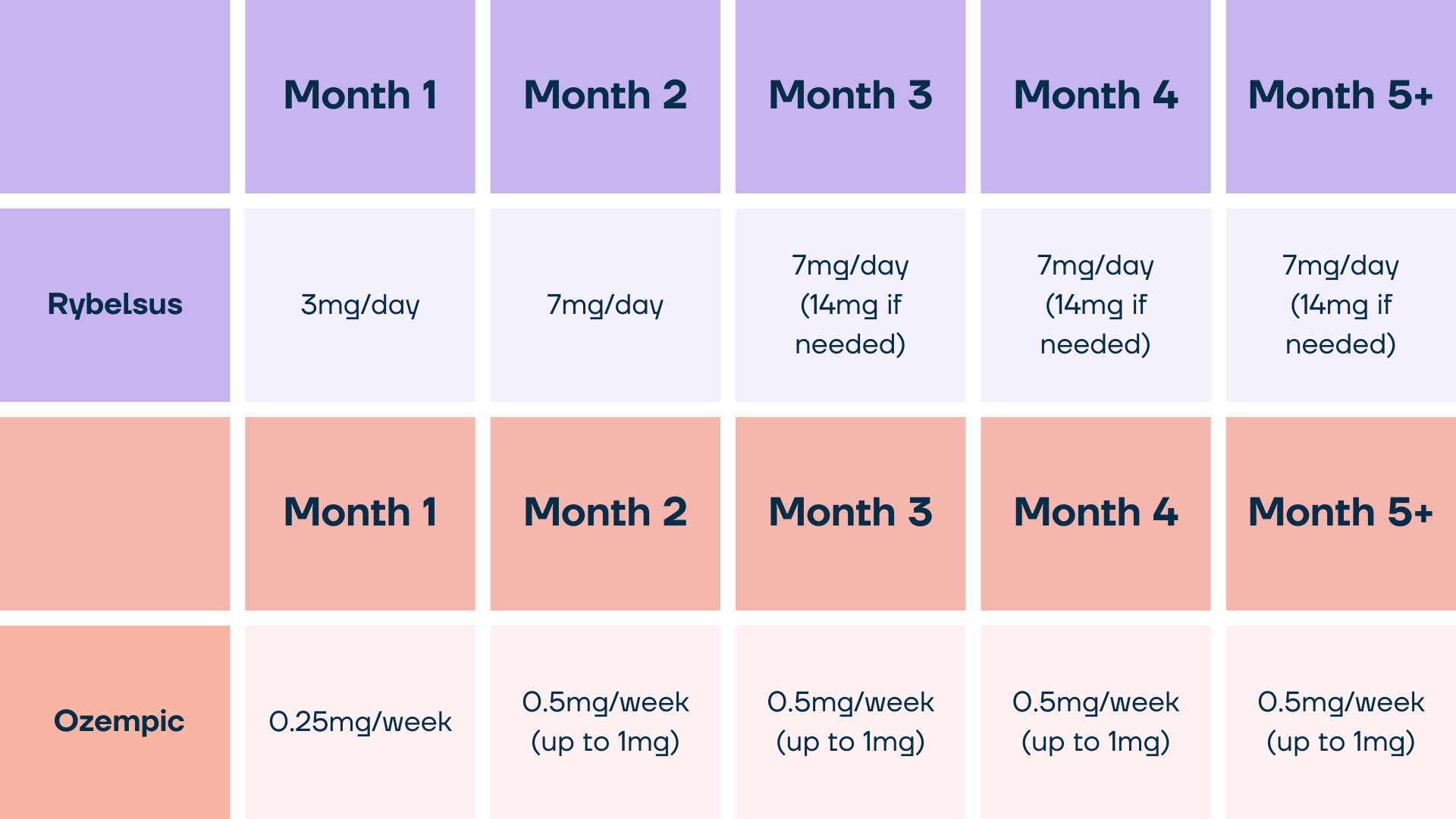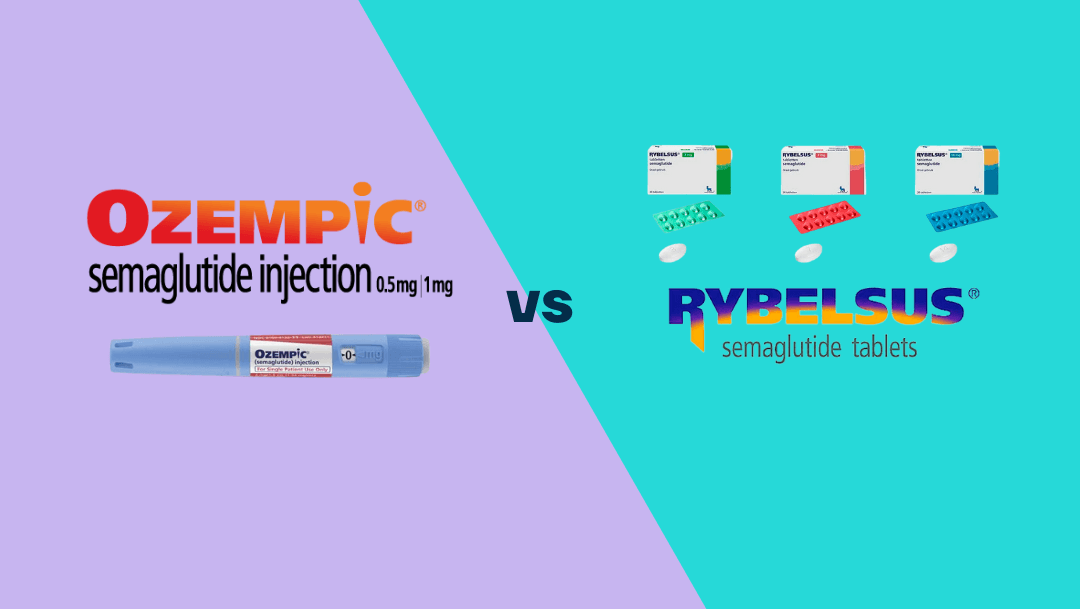Jump to: What do Ozempic and Rybelsus do to the body? | Do you lose more weight on Ozempic or Rybelsus? | Ozempic vs Rybelsus: Which is better? | Take home message
Ozempic and Rybelsus are the same drug, semaglutide, but they come in different forms.
Ozempic is an injectable medication taken once a week, and Rybelsus is an oral medication taken once a day.
According to data from randomised controlled trials, Ozempic and Rybelsus lead to similar reductions in weight and blood sugar.
Their dosing also differs, with Ozempic rising from 0.25 mg up to 1 mg weekly after two months. Rybelsus starts at 3 mg daily, rising to 14 mg after three months if needed.
Ozempic and Rybelsus Dosage

Ozempic and Rybelsus are only approved for individuals living with type 2 diabetes in the UK. So, you can only purchase Ozempic and Rybelsus for type 2 diabetes; they can’t be prescribed for weight loss.
Available weight-loss medications in the UK market are Wegovy (semaglutide 2.4 mg), Saxenda (liraglutide), and Orlistat.
Semaglutide isn’t a magic pill
Weight-loss injections are designed as additional tools for healthy lifestyle change and shouldn’t be considered as lifelong medications.
Instead, they should be used to help you kickstart your weight-loss journey whilst you focus on building new, healthy habits.
Consider the use of antidepressants for people living with depression. They’re not designed to cure the condition. Instead, they’re designed to allow room for therapy to treat the condition’s underlying cause.
Mounjaro and Wegovy are similar. These medications can help silence food-related thoughts and also give you a boost of confidence with more immediate weight-loss results.
This helps to buy you the time and headspace to understand why your body may have struggled to lose weight previously, and to build new long-term healthy habits.
The core focus of our medication programmes are to calm down the feeling of food noise, lower your cravings, and to allow you to build healthier habits to keep the weight off for good.
The ultimate goal is to make losing weight feel second nature.
Second Nature’s medication programme
Second Nature currently provides Mounjaro as part of our Mounjaro weight-loss programme.
Why should you choose Second Nature over other medication providers if you’ve decided to try Mounjaro (assuming you’re eligible)?
For peace of mind.
Second Nature has worked with the NHS for over 6 years providing weight-loss programmes across the UK.
While our Mounjaro weight-loss programme is private and not currently used by the NHS, we’ve built the programmes focusing on scientific evidence, patient safety, and data security.
We hope that our 6+ years of working with the NHS and building a track record of effective weight-loss results will give you peace of mind to give us a try.
Otherwise, keep reading as we examine the science of Ozempic and Rybelsus.
1) What do Ozempic and Rybelsus do to the body?
When we eat food, our gut releases hormones that help the body regulate hunger and blood sugar levels. GLP-1 (glucagon-like peptide 1) is one of these hormones and has a significant role in managing our appetite.
GLP-1 improves insulin function to lower blood sugar levels and delays gastric emptying, which helps decrease appetite as it takes longer for food to pass through our digestive system.
The hormone GLP-1 also communicates with the brain’s appetite control centre, the hypothalamus, to lower hunger and food-seeking behaviour.
Ozempic and Rybelsus (semaglutide) mimic the actions of the hormone GLP-1 and are known as GLP-1 receptor agonists or GLP-1s.
The actions of semaglutide on the gut and brain make us feel less hungry and lower our desire to eat. This helps us eat fewer calories so that we can lose weight.
How long does it take Ozempic and Rybelsus to work?
Semaglutide is a long-acting medication, so it can take up to 4-5 weeks to reach what’s known as a ‘steady state’ where the drug maintains higher levels in the blood rather than rising and falling.
So, in the first month or two of taking the medication, we may notice our hunger levels changing as the drug’s blood levels rise and fall.
Key points:
- When we eat food, our body produces hormones to signal to the brain to lower hunger. GLP-1 is one of those hormones.
- GLP-1 helps the pancreas release more insulin to lower blood sugar levels and delay stomach emptying to lower appetite
- Ozempic and Rybelsus are the same drug and contain the active ingredient semaglutide
- Semaglutide mimics the hormone GLP-1 to lower blood sugar levels and reduce hunger
- Semaglutide can help us eat less and lose weight
2) Do you lose more weight on Ozempic or Rybelsus?
According to data from randomised controlled trials, Ozempic supports slightly more average weight loss than Rybelsus. Although, the difference isn’t significant.
After 26 weeks, research has shown that taking 1mg of Ozempic results in an average weight loss of around 4.5kg, compared to 3.7kg on Rybelsus.
So, on average, taking Ozempic leads to 0.7kg more weight loss than taking 14mg of Rybelsus.
However, these differences aren’t considered clinically significant. Therefore, Ozempic and Rybelsus may lead to similar average weight loss.
Interestingly, researchers have been investigating higher doses of Rybelsus, up to 50mg per day, and found it can support weight loss of over 20% after 68 weeks.
These results suggest that higher doses of Rybelsus can support more weight loss than Ozempic 1 mg. However, Rybelsus is only approved in doses up to 14mg in the UK and only as a type 2 diabetes medication.
So, based on the currently available doses, Ozempic and Rybelsus generally support similar levels of weight loss after 26 weeks.
Ozempic vs Rybelsus: Which one is better for HbA1c?
According to data from randomised controlled trials, Ozempic is slightly better at reducing average HbA1c levels.
After 26 weeks, research suggests Ozempic leads to an average HbA1c reduction of 1.6 percentage points. Equivalent to around 17.4mmol/mol.
In comparison, Rybelsus leads to an average HbA1c of 1.4 percentage points. Equivalent to around 15.3mmol/mol.
These differences are very small and wouldn’t be considered clinically significant. Therefore, it’s likely that Ozempic and Rybelsus lead to very similar reductions in blood sugar levels after 26 weeks.
Key points:
- Research suggests that Ozempic and Rybelsus lead to similar reductions in weight and blood sugar
- However, researchers are investigating the impact of higher Rybelsus doses (up to 50 mg daily), and this seems to support greater weight loss than Ozempic
3) Ozempic vs Rybelsus: Which is better?
Based on the currently available doses, Rybelsus and Ozempic generally result in similar reductions in weight loss and blood sugar. Therefore, neither one can be considered superior to the other.
Whether Ozempic or Rybelsus is the better treatment option for you depends on your individual situation, response to treatment, and your healthcare team’s assessment.
Side effects and safety
All medications have possible side effects, particularly if you live with other health conditions.
Some will be mild but uncomfortable, such as cramping, and others will be more severe, such as shortness of breath. You must report any side effects you experience to your doctor and healthcare team when on medications.
The side effect profiles of Ozempic and Rybelsus are very similar as they’re the same medication.
The most common side effects in both medications are GI-related, such as nausea, diarrhoea, and vomiting, with around 20% of participants experiencing these side effects at least once and 60-75% of patients on these medications experiencing at least one adverse side effect.
Our individual responses to medications will vary, and some people might respond better to Ozempic than Rybelsus and vice versa.
Ozempic and Rybelsus Cost
To purchase Ozempic and the four weeks of injectable pens required costs £229 with Second Nature. This includes access to our NHS-trusted weight-loss programme with access to a registered dietitian or nutritionist.
If you’re prescribed Ozempic on the NHS, it would cost the standard base fee of £9.95 in England. Privately, it may cost up to £300 a month. But, you must be living with type 2 diabetes to purchase Ozempic.
To purchase Rybelsus privately would cost around £130 a month. You need a prescription for Rybelsus and must be living with type 2 diabetes.
You may also be prescribed Rybelsus as a type 2 diabetes medication via the NHS; this would cost the standard base fee of £9.95.
Key points:
- Ozempic and Rybelsus lead to similar results, so what medication you decide to choose will depend on your situation and how well you respond to the different medications
- Both medications have a similar side effects profile as they’re the same medication
- Both medications are available via the NHS and can be purchased privately if you’re living with type 2 diabetes
Take home message
The recent innovations in GLP-1 medications are pretty remarkable and have caused quite a stir in the world of healthcare.
We’re in new territory where obesity and type 2 diabetes medications treat an underlying cause instead of merely treating the symptoms to support better management.
However, these drugs shouldn’t be seen as miracle cures; they’re not designed to be used for life.
They’ve been designed to be taken alongside lifestyle changes that will enable you to eventually come off the medications and maintain your lower weight for the long term.
Semaglutide is safe and effective for most people in the short to medium term, but we don’t have long-term data to be sure they’re not causing severe adverse effects elsewhere.
At Second Nature, we’re not against using medications to support people in making healthy changes and reducing their risk of chronic disease.
However, we don’t recommend using medications as a reason not to make healthy lifestyle changes. The causes of obesity and type 2 diabetes aren’t merely rooted in biology but also in psychology and sociology.
With these medications, you may lose weight and reduce blood sugar levels. But will you be happier? Will you be more fulfilled? Will you be content with your life and social relationships?
For that, you may need to consider a lifestyle change.





